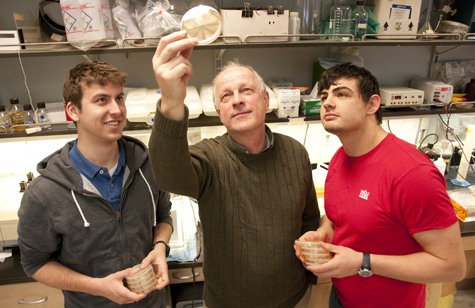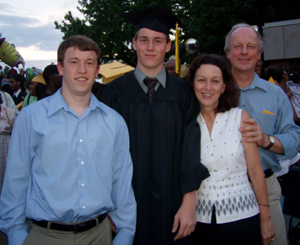
Growing up in Wassenaar, Netherlands, a small town near the North Sea, Peter Burgers, PhD, remembers a carefree childhood. The middle of seven children, Burgers and his siblings spent much time outside, including summers at the beach.
But a carefree childhood does not mean one without direction.
“My father was a teacher, and he valued education,” Burgers says. “He wanted all of us to go to university, which was unusual in those days.”
That parental influence clearly was felt as the family now includes a biochemist, an engineer, two medical doctors, two nurses and a geologist. Today, Burgers is the Marvin A. Brennecke Professor of Biological Chemistry at Washington University School of Medicine in St. Louis. He is an expert in DNA replication and repair — fundamental cellular processes shared across organisms, from yeast to humans.
“Peter is known around the world for his expertise in the genetics and biochemistry of DNA replication and cellular responses to damaged DNA,” says Thomas E. Ellenberger, DVM, PhD, the Raymond H. Wittcoff Professor and head of the Department of Biochemistry and Molecular Biophysics. “He is well-known for reconstituting impossibly difficult protein complexes and showing the field how things work at the molecular level.”
Indeed, Burgers recently was honored for his scientific contributions with an honorary doctorate in medicine from Umeå University in Sweden. During the ceremony, Bengt Jårvholm, MD, PhD, dean of the Umeå School of Medicine, praised Burgers’ work, his support for international collaborations, and his mentoring of faculty at Umeå University. The celebration included Burgers’ general lecture to the Umeå community. Afterward, festivities continued with a university-wide reception and banquet.
Guru on DNA synthesis
Before earning honorary degrees, Burgers began his career path studying organic chemistry at the State University of Leiden, not far from his hometown. As a doctoral student, he synthesized small pieces of DNA. Later, as a researcher at the Max Planck Institute in Gottingen, Germany, he worked with DNA polymerases, essential enzymes involved in replicating and repairing DNA.
“I noticed when I was working on a DNA polymerase that this enzyme synthesized DNA a thousand times faster than I had done it as a PhD student in Leiden,” Burgers says.
This interest in DNA polymerase took him to Stanford University and the lab of the late Nobel laureate Arthur Kornberg, MD, DSc.
“He was the guru on DNA synthesis,” Burgers says of Kornberg, who won the Nobel Prize in Physiology or Medicine in 1959 for his discovery of DNA polymerase. Kornberg was at Washington University when he made his discovery. “He alerted me to Washington University as a potential place for a faculty position,” Burgers says.
Today, Burgers and his team study how cells copy DNA and how they repair damaged DNA in yeast. Yeast is a great model organism because they contain much of the same machinery that human cells do.
“By understanding how this works in yeast, we can begin understanding how it works in human cells,” Burgers says. “Often it’s more complicated in human cells. But the master switches are present in yeast as they are in human cells.”
Before any cell divides, it must copy its DNA so that the two new cells each have a complete set of genetic material. Ideally, the sets should be identical.
“If you want to maintain that precise identity of DNA in our cells, we need to replicate DNA with extraordinary fidelity. In human cells, that means making less than one mistake out of three billion,” Burgers says. “In reality, we don’t even approach that. Every cell in your body may have a slightly different sequence.”
When the DNA is perfect, the cell uses what Burgers calls “perfect machinery” to replicate the strand. But often, this perfect machinery will encounter a barrier it can’t navigate past, like damaged DNA or a protein bound to the DNA.
“At some frequency, the cell will switch to a machinery that’s less perfect. This machinery can bypass the barrier, but it introduces mutations. After the barrier is bypassed, the cell switches back to the perfect machinery and finishes replication,” Burgers says.
Introducing mutations, a process called mutagenesis, can have consequences for the cell, the whole organism and even entire species.
“On one hand, there are beneficial mutations that lead to a fitter organism,” Burgers says. Such beneficial mutations are passed on to future generations through natural selection.
“But on the other hand,” he says, “there are deleterious mutations that lead to loss of control of proliferation and to cancer development.”
Burgers says that a big question he would like his research to shed light on is how cells balance these beneficial and harmful mutations. Despite the fact that it potentially can lead to cancer, mutagenesis is essential to life, even when the cells aren’t damaged.
“When you delete the genes that carry out mutagenesis in a mouse, the embryo will never even develop,” Burgers says.
Unique among scientists
John Majors, PhD, associate professor of biochemistry and molecular biophysics, says Burgers is unique in the way he runs his lab.
“He’s actively involved in doing the research himself, which is rare for someone of his stature,” Majors says. “He’s not just a manager; he’s a scientist. I don’t think he could stand not working in the lab.”
In addition to his dedication to research, Burgers delights in the creativity and determination of his students.
“I am particularly delighted when a student or postdoc comes to me and says ‘I want to do this,’ and I say, ‘It’s never going to work.’ But they do it anyway and get a result that drives us into new directions,” Burgers says. “This is what I live for, being part of the discovery process with students and postdocs.”

For Burgers, science is a family affair. His wife, Bonita Yoder, is a senior research technician in his lab. Like his father, Burgers instilled the importance of education in his own sons. The oldest, Alex, graduated from Washington University and is pursuing a doctorate in physics at the University of Michigan, Ann Arbor. The younger, Mark, graduated from Saint Louis University in 2010 with a degree in chemistry and is deciding among graduate schools.
When Burgers is not in the lab, he still enjoys the outdoors, including backpacking and gardening with his wife.
Another hobby takes Burgers, an avid reader, to secondhand bookstores.
“I like old books,” Burgers says. “I’m trying to get all of the first editions of Charles Dickens’ novels.”
He already has seven, including a signed copy of Nicholas Nickleby.
Fast facts about Peter Burgers
Born: Wassenaar, Netherlands
Currently reading: Tinkers, by Paul Harding
Christmas gift for his son Mark: Basics of Colloidal Chemistry, published in 1909, by Carl Wilhelm Ostwald, the father of colloidal chemistry
Honors and awards: Fellow, American Association for the Advancement of Science; established investigator, American Heart Association; Searle Scholar; fellow, American Cancer Society